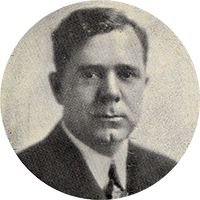Upon his election, Huey transformed the state bureaucracy by mastering the existing political patronage system. He installed supporters in every level of government, often placing a premium on competence over cronyism. He cultivated loyalty by giving people a chance to work in his administration, and it soon became common practice for average citizens to approach him for a job, college scholarship, or any other type of assistance.
Huey immediately pushed a number of bills through the legislature to fulfill his campaign promises, including a free textbook program for schoolchildren, night courses for adult literacy, and piping natural gas to New Orleans. He also launched a massive building program of roads, bridges, hospitals, and educational institutions.
Huey's bills met stiff opposition from many legislators and the state’s newspapers, which were financed by the state’s business interests, but Huey used wily and hard-ball methods (see "Long's Political Methods") to win passage of his bills. Huey was in a hurry to get things done and passed scores of laws that enabled him to enact his programs. A legal genius, Huey skillfully used the law to his advantage — without breaking it. Opponents accused Long's administration of graft and overspending, when in fact he ran a fiscally tight ship. Louisiana had the third-lowest cost of government in the nation while providing unprecedented services to its people.

Huey Long leading the LSU marching band ~ Courtesy of the Louisiana State Archives.
As Governor, Huey became an active promoter of Louisiana State University. He expanded the campus, tripled enrollment, and built LSU into one of the best schools in the South and the eleventh largest state university in the country. Huey lowered tuition and instituted scholarship programs that enabled poor students to attend. He also established the LSU medical school to meet the state's desperate need for new doctors. He frequently attended LSU football games, giving locker room pep talks to players and advice to coaches, and he even composed the LSU fight song, “Touchdown for LSU,” which is still played before every football game.
The public soon began to see the tangible results of a massive building program to modernize Louisiana. As the nation plunged into the Great Depression after the stock market crash of 1929, thousands of Louisianians were at work building the state’s new infrastructure. Louisiana employed 22,000 men just to build the roads — ten percent of the nation's highway workers. With greater access to transportation, education and healthcare, the quality of life in Louisiana was rapidly improving while the rest of the nation declined.
To finance these improvements, Huey restructured the tax system, shifting the burden from the poor to large businesses and the state’s wealthiest citizens (see "How Did Long Pay for His Programs?" below). Huey taxed oil operators to finance his free textbook program, provoking the wrath of Standard Oil, which launched an unsuccessful attempt to remove him from office.
When opponents blocked Huey’s bills in the 1930 legislative session, he responded by running for the U.S. Senate as a referendum on his programs. After his commanding victory, Huey pursued his agenda with renewed strength and formed an uneasy alliance with the “Old Regulars” and their chief, New Orleans Mayor T. Semmes Walmsley (nicknamed “Turkey Head” Walmsley by Huey). The alliance guaranteed support for Long’s programs and candidates in exchange for major structural improvements in New Orleans.





